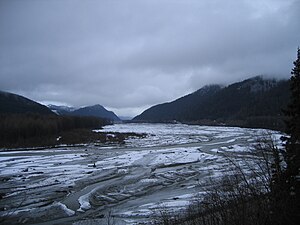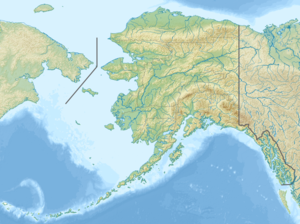Klehini River
| Klehini River | |
|---|---|
 Near mile 27 of the Haines Highway | |
| Location | |
| Country | Canada, United States |
| Physical characteristics | |
| Source | unnamed glacier |
| • location | Nadahini Mountain, British Columbia |
| Mouth | Chilkat River |
• location | opposite Klukwan, 22 miles (35 km) west of Skagway, Saint Elias Mountains, Alaska |
• coordinates | 59°24′42″N 135°55′48″W / 59.41167°N 135.93000°W[1] |
• elevation | 112 ft (34 m)[1] |
| Length | 42 mi (68 km)[2] |
The Klehini River is a large, glacially fed stream in the vicinity of Haines in the U.S. state of Alaska.
The Klehini River is about 42 miles (68 km) long from its source in British Columbia to its mouth at the Chilkat River,[2] of which it is the largest tributary. The Klehini River is renowned for its salmon runs, its biannual congregation of bald eagles—the second largest in the Haines area after the Chilkat River's Council Grounds—and for the Klehini Falls. The Klehini also delineates the northern boundary of the Chilkat Range.
The name Klehini appears to be derived from the Tlingit phrase l’éiw héeni, which translates to river with sand or gravel in it. [3] The Klehini River contains abundances of both sand and gravel.
The lower Klehini is located within the Alaska Chilkat Bald Eagle Preserve.
Walt Disney's 1991 rendition of White Fang was filmed along the Klehini River.
Klehini Falls
The Klehini Falls are a series of four cataracts in far northwestern British Columbia occurring in a narrow gorge near the headwaters of the Klehini River. The falls are separated from one another by a distance of approximately 300 feet (91 m), with an average plunge of 30 to 40 feet (9.1 to 12.2 m). The individual cataracts are currently unnamed.
Threats
The Klehini and Chilkat Rivers were listed among America's Most Endangered Rivers in 2023 due to threats from the Palmer Project, a proposed underground copper and zinc mine sited upstream from the Tlingit village of Klukwan. If built, the project is feared to result in pollution from acidic wastewater laced with heavy metals and hydrocarbons.[4]
See also
References
- ^ a b "Klehini River". Geographic Names Information System. United States Geological Survey. January 1, 2000. Retrieved January 2, 2014.
- ^ a b Orth, Donald J.; United States Geological Survey (1971) [1967]. Dictionary of Alaska Place Names: Geological Survey Professional Paper 567 (PDF). United States Government Printing Office. p. 530. Retrieved January 1, 2014.
- ^ See, Edwards, Keri (2009). Dictionary of Tlingit (PDF). Sealaska Heritage Institute. pp. 16 (possessive suffix –[y]i), 118 (héen), 187 (l’éiw). ISBN 978-0-9825786-6-7. Retrieved 2015-09-14.
- ^ Rosen, Yereth (19 April 2023). "Looming mine development puts Southeast's Chilkat-Klehini system on list of endangered rivers". Alaska Beacon. Retrieved 8 August 2023.


